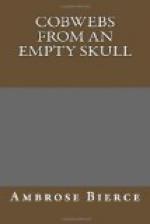PREFACE.
The matter of which this volume is composed appeared originally in the columns of “Fun,” when the wisdom of the Fables and the truth of the Tales tended to wholesomely diminish the levity of that jocund sheet. Their publication in a new form would seem to be a fitting occasion to say something as to their merit.
Homer’s “Iliad,” it will be remembered, was but imperfectly appreciated by Homer’s contemporaries. Milton’s “Paradise Lost” was so lightly regarded when first written, that the author received but twenty-five pounds for it. Ben Jonson was for some time blind to the beauties of Shakespeare, and Shakespeare himself had but small esteem for his own work.
Appearing each week in “Fun,” these Fables and Tales very soon attracted the notice of the Editor, who was frank enough to say, afterward, that when he accepted the manuscript he did not quite perceive the quality of it. The printers, too, into whose hands it came, have since admitted that for some days they felt very little interest in it, and could not even make out what it was all about. When to these evidences I add the confession that at first I did not myself observe anything extraordinary in my work, I think I need say no more: the discerning public will note the parallel, and my modesty be spared the necessity of making an ass of itself.
D.G.
FABLES OF ZAMBRI, THE PARSEE.
[Illustration]
I.
A certain Persian nobleman obtained from a cow gipsy a small oyster. Holding him up by the beard, he addressed him thus:
“You must try to forgive me for what I am about to do; and you might as well set about it at once, for you haven’t much time. I should never think of swallowing you if it were not so easy; but opportunity is the strongest of all temptations. Besides, I am an orphan, and very hungry.”
“Very well,” replied the oyster; “it affords me genuine pleasure to comfort the parentless and the starving. I have already done my best for our friend here, of whom you purchased me; but although she has an amiable and accommodating stomach, we couldn’t agree. For this trifling incompatibility—would you believe it?—she was about to stew me! Saviour, benefactor, proceed.”
“I think,” said the nobleman, rising and laying down the oyster, “I ought to know something more definite about your antecedents before succouring you. If you couldn’t agree with your mistress, you are probably no better than you should be.”
People who begin doing something from a selfish motive frequently drop it when they learn that it is a real benevolence.
II.
A rat seeing a cat approaching, and finding no avenue of escape, went boldly up to her, and said:




